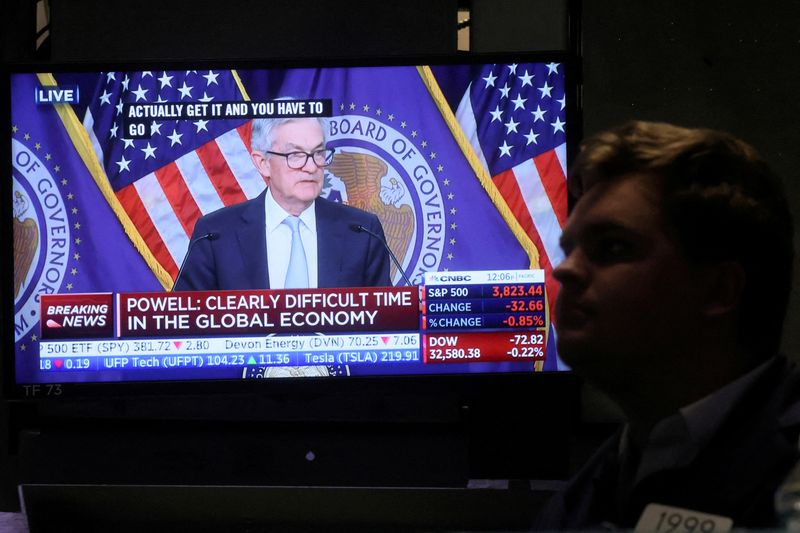
© Reuters. FILE PHOTO: A screen displays Federal Reserve Chair Jerome Powell speaking as a trader works on the floor of the New York Stock Exchange (NYSE) in New York City, U.S., November 2, 2022. REUTERS/Brendan McDermid/File Photo
US500
+0.59%
Add to/Remove from Watchlist
Add to Watchlist
Add Position
Position added successfully to:
Please name your holdings portfolio
Type:
BUY
SELL
Date:
Amount:
Price
Point Value:
Leverage:
1:1
1:10
1:25
1:50
1:100
1:200
1:400
1:500
1:1000
Commission:
Create New Watchlist
Create
Create a new holdings portfolio
Add
Create
+ Add another position
Close
By David Randall and Lewis Krauskopf
(Reuters) – Investors seeking justification for breathtaking rallies in stocks and bonds are finding hope in the words of Federal Reserve Chair Jerome Powell, even as the central bank insists the fight against inflation has a long way to go.
Signs of easing inflation have ignited bets that the Fed will begin loosening its restrictive monetary policy earlier than expected, driving the S&P 500 to its biggest monthly gain for more than a year in November. Yields on the U.S. benchmark 10-year Treasury, which move inversely to prices, saw their steepest decline in more than a decade.
Some investors believe Powell may have signaled an incremental shift to a more dovish outlook on Friday, when he said the risks of moving too far with interest rate hikes have become “more balanced” with those of not moving high enough to control inflation.
The S&P 500 climbed nearly 0.7% and was on pace to finish at its highest closing level of the year after the comments – which were made ahead of a quiet period before the Fed’s Dec. 12-13 monetary policy meeting. Two-year Treasuries, which are sensitive to interest rate expectations, fell nearly 15 basis points to their lowest level since June.
The Fed chair reiterated that the fight against inflation was far from finished and said the central bank was ready to further tighten monetary policy if necessary.
“He provided balanced comments, both dovish and hawkish, and the markets are very much ignoring the hawkish comments and grabbing onto the dovish comments that the Fed is essentially done,” said Paul Nolte, senior wealth advisor and market strategist at Murphy & Sylvest Wealth Management.
Evidence of slowing inflation has piled up in recent weeks. On Thursday, data showed that the Fed’s preferred inflation measure, the core PCE price index, eased in October, complementing other reports indicating cooling consumer prices and softer economic activity.
Trader bets on Fed rate cuts starting in the first half of 2024 gained steam this week after Fed Governor Christopher Waller, an influential and usually hawkish policymaker, suggested rates cuts by then could be needed to keep policy from becoming overly restrictive in the face of easing inflation.
Federal funds futures, a widely used security for hedging short-term interest rate risk, imply a Fed funds rate of 4.533% by the end of July, versus 5.121% expected three months ago for that period, according to LSEG data.
Investors see a strong chance of the central bank delivering a rate cut as early as March 2024, LSEG data show.
“Powell is essentially saying that inflation is coming down faster than we expected and now we can just coast and see what happens. That’s the message. And as a market participant I will always take that message as something that’s dovish,” said Ed Al-Hussainy, a senior analyst at Columbia Threadneedle Investments, who is positioning for rates to fall further.
Of course, the market has misread the Fed and economic conditions several times in recent years and may be doing so again. In late 2022, for example, many expected a recession would hit this year, forcing the Fed to loosen monetary policy. The economy proved resilient while monetary policy stayed tight.
“Clearly they are in a no man’s land here and the market hears what it wants to hear,” said James St. Aubin, chief investment officer at Sierra Investment Management, who runs a tactical trend-following portfolio. “Powell is trying to take a very measured approach to guidance and not giving anyone too much on one side or the other.”
Source: Investing.com


























